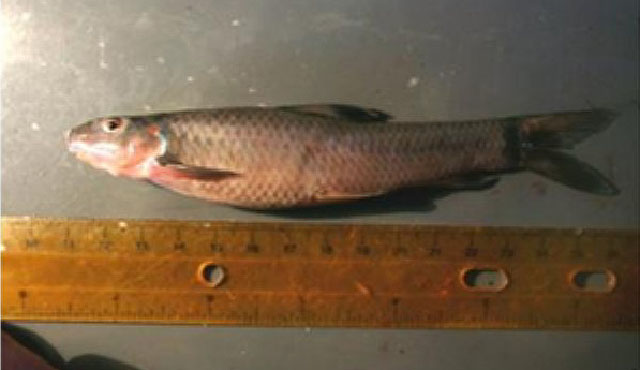|
Dorsal spines (total): 0-0; Dorsal soft rays (total): 11-11; Anal spines: 0-0; Anal soft rays: 9-9. Diagnosis: Garra dembecha is distinguished from African congeners by the following combination of features: weakly developed disc; predorsal region partially scaled anterior to dorsal fin; chest, belly, and postpelvic region asquamate; moderately elongate intestine; large gas bladder; and vent situated distant from anal fin (Ref. 58532).
Description: Body relative gracile, greatest body depth located midway between dorsal-fin origin and snout (Ref. 58532). Head gracile and depressed, without tubercles on snout; eyes positioned medially on head (Ref. 58532). Dorsal head profile rises steeply over snout, dorsum of head more-or-less flattened, dorsal body profile weakly convex, almost flat to dorsal-fin origin in most specimens, although in some larger individuals dorsal body profile rises steeply behind head and is smoothly convex to dorsal fin (Ref. 58532). Disc weakly developed, but often with narrow free posterior edge in large specimens, and usually wider than long; rostral cap well developed, extending ventrally over upper jaw and with invecked ventral margin (Ref. 58532). Two pairs of barbels; maxillary barbels usually about the same length as rostral pair (Ref. 58532). Either 37 or 38 scales along lateral line; either 5 or 6 predorsal scales anterior to dorsal fin; 3.5 scales from lateral line to origin of pelvic fins; 5.5 scales from lateral line to dorsal-fin origin; chest, belly and postpelvic region asquamate (Ref. 58532). Dorsal fin with iv,7 rays, inserted well in advance of pelvic fin, with a slightly rounded tip, first and second unbranched rays longest; anal fin with iv,5 rays, with subacuminate tip; pectoral fin with iv,12 rays, its length 16.6-22.3% of standard length, with somewhat pointed tips (Ref. 58532). Predorsal length 45.3-54.4% of standard length (Ref. 58532). Vent distant from anal fin (Ref. 58532).
Colouration: Body brown dorsally, slightly lighter brown below lateral line and ventrally; trace of midlateral band of variable width often present on flanks and caudal peduncle; distinct bar spanning depth of caudal peduncle, just anterior to caudal fin (Ref. 58532). Dorsum of head, snout and most of opercle dark brown; lips, gular region, posterior margin of opercle and branchiostegal membranes creamy yellow-brown; entire cheek often pale creamy brown, with pale coloration extending around entire eye; characteristically well-developed, small black spot present just behind opercle, in region of first lateral line scale (Ref. 58532). Dorsal fin membrane pale cream distally, with strongly pigmented, wide black submarginal band in membrane between rays, and narrow pale cream band proximally; either 4 or 5 elongate black spots extend dorsally between rays in basal membrane of dorsal fin, often reaching into basal third of dorsal fin; anal fin uniformly pale creamy brown; caudal fin pale dusky brown, with median rays a slightly darker brown; pelvic and pectoral fins uniformly pale creamy brown (Ref. 58532). |

